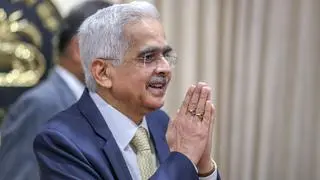India is seeking changes in the draft ministerial decision on exempting World Food Programme food purchases from export prohibition floated at the on-going WTO Ministerial Conference (MC12) so that it includes its key demands of allowing exports for food aid, including on government-to-government (G2G) basis, from public stocks, a source tracking the matter has said.
“The draft text on exemption for WFP food purchases is not acceptable to India in its present form. It will keep pushing for incorporation of its demands in the final ministerial decision during the discussions on Monday and Tuesday,” the source said.
Focus areas
Draft ministerial decisions in a number of areas, such as agriculture, fisheries, WFP food purchases and WTO response to Covid-19 pandemic, were circulated at the WTO ahead of the MC 12 which began on June 12 with the objective of arriving at final agreements by June 15.
Related Stories
WTO Ministerial: India bats for resolution on public stockholding
Right to life and livelihood of fishers cannot be curtailed in any manner, says Piyush GoyalThe draft decision on WFP food purchases stated that members shall not impose export prohibitions or restrictions on foodstuffs purchased for non-commercial humanitarian purposes by the WFP. It also added that the decision would not prevent members from taking measures to ensure their domestic food security in accordance with the relevant provisions of the WTO Agreements.
This mostly reflects the initial plan laid by Singapore in November 2020 for exempting WFP’s non-commercial purchases from any export restrictions which eventually got the support of about 80 members.
“India has made it clear to the WTO that it has never refused to supply food to WFP. In fact, in the past, it has been one of the leading contributors to WFP. At the same time, it has been extending support to neighbours with food supplies. Its demand that exemptions from export restrictions be also extended for G2G supplies and exports be allowed from public stocks will ensure food security for many more,” the source added.
The WTO, at present, does not allow exports from food stocks procured by governments at administered prices. India’s argument is that these stocks should be allowed to be exported as long as it is not for a commercial purpose.
According to Swadeshi Jagran Manch (SJM) chief Ashwani Mahajan, not extending the proposed exemption from export prohibition to G2G supplies was part of the agenda pursued by the developed world which favours corporate interests. “Corporates engage in commodities trade for profit while India wants to supply on G2G basis to help out other members in need. We need to keep pushing our agenda,” said Mahajan.
The WFP decision could be beneficial but it covers such small volume of trade that it cannot make a big impact on solving global food security concerns which needs more systemic solutions, believes Larissa Avelar, Leader, The Norwegian Solidarity Committee with Latin America.
“These efforts must be matched by a permanent solution on public stockholding issue as that is a critical tool to deliver food to the poor and hungry in developing countries, NFIDCs and LDCs. The critical need is also to increase domestic production by pushing important agendas such as subsidising of small farmers and agrarian reform, as land concentration is an endemic problem in Latin America, where I come from,” she said.







Comments
Comments have to be in English, and in full sentences. They cannot be abusive or personal. Please abide by our community guidelines for posting your comments.
We have migrated to a new commenting platform. If you are already a registered user of TheHindu Businessline and logged in, you may continue to engage with our articles. If you do not have an account please register and login to post comments. Users can access their older comments by logging into their accounts on Vuukle.